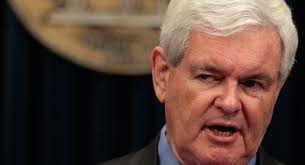Intellectuals in Politics?

So a professor of philosophy—Gary Gutting—opinionating for the NYT invites us to think about the relationship between politicians and intellectuals. He says that politicians, to be credible, don’t have to be intellectuals, but they have to have intellectual lives. They have to be consumers of what intellectuals (or experts) write in their journals—such as Scientific American and The New York Review of Books. He also recommends that the candidates have a debate that is basically a quiz on whether they know and can think about what intellectuals know—about history, policy, and such.
The professor also notices that the Republican candidates tend to take pride in being anti-intellectual. The exception, of course, is Newt Gingrich, Ph.D, who has done well in the debates by speaking with the authority of a professor on a great variety of issues. Newt, having not worked in politics and having spent his time hanging around a conservative think-tank for over a decade, seems to have taken on many of the trappings of an intellectual. Newt’s lead in the polls might be evidence that even Republicans are much more open to intellectual leadership than the professor believes.
Our professor concludes by being excited, as are others, with the prospect of a race between two professor-candidates, our president and our former speaker. That would make for some very interesting debates, no doubt. But you have to wonder whether (intellectually informed) skill in debating actually predicts outstanding or even competent presidential leadership. The prediction does work for Lincoln, but we remember he barely went to school and never hung out with intellectuals.
Our only Ph.D president, Woodrow Wilson, made a strong, scholarly case for the presidential leadership being about visionary, idea-charged rhetoric. But it’s easy to make the strong case that his misguided idealism—as haphazardly implemented in his second term—actually really screwed up the world. It’s also easy to make the case—even to his liberal or Progressive supporters—that our current president’s competence has not risen to anywhere near the level of his soaring campaign rhetoric. Someone might say our (law) professor-president came to office lacking the experience—and so the knowledge—required to know how to lead.
Newt has the edge on President Obama in one way: He served for two decades in Congress, after failing to do what’s required as a professor to get tenure. Those who worked closely with him as speaker don’t speak well of his organizational skills, and they say a lot about his general instability and his obsessive sense of self-importance. His “vision thing” helped the Republicans regain the House after a long absence and got him elected speaker. But he was, on balance, a forced-out failure as speaker. The evidence is that he doesn’t have the character and temperament, beginning with self-discipline, to be chief executive.
The professor defines the intellectual as someone who finds fulfillment and happiness in the life of the mind, someone who finds his (or her) natural home in the university. Gutting is such a purist that he complains that even the universities are being contaminated by corporatist and political concerns. He cites Plato’s Republic to support his point.
But in the Republic Socrates distinguishes carefully between the philosopher and the intellectual (or sophist). The philosopher, the purist when it comes to his lifetime devotion to the truth about all things, doesn’t want to rule, and he’d have to be forced to take an interest in political affairs. For the real philosopher, the questions are more obvious the answers, and Socrates himself was famous for ending conversations with a confession that he remained too ignorant to know what to do. Socrates would be a very ineffective policy advisor—lacking both the expertise and the motivation to tell the chief executive what he most needs to know.
Socrates talks about the rule of philosopher-kings, but he has to distort who philosophers really are to make that possibility plausible. The philosopher-king is a wise man—not a seeker of wisdom like Socrates. He knows the idea of the good, what gives being its beingness. Not only is he perfect when it comes to wisdom, he’s a perfect ruler. He knows both what is and what to do. The professor is right to object that there’s nobody real like that, and Socrates, of course, knew that too.
The intellectual, for Socrates, is the sophist, the person who employs his knowledge to gain wealth, power, and recognition. He may sometimes be idealistic enough to believe he can really improve the world. But usually he puts his knowledge at the service of a particular ruling group in his own interest (think the Newt who got big bucks to make a persuasive case for Freddie Mac).
The sophist is never as smart as he thinks he is, but he certainly is confident of his expertise. He really does know something, but he believes he knows everything. And usually he mistakes technical competence for the whole of wisdom, forgetting the irreducible moral component in human lives, the part that can’t be captured by expertise. The explanatory theories of economists immediately come to mind here, as do Newt’s (and others’) various forms of techno-enthusiasm.
The famous sophist in the Republic, Thrasymachus, gets an unfairly bad rap. At a certain point in the conversation, Socrates even says that he and Thrasymachus have become friends. He’s why: A sophist would be indispensable for persuading people that philosophers should rule, for gentling them with tricky arguments that are far from wholly reasonable or in their true interests. The Republicans, we might want to say, often are spirited enough to see through the trickiness of sophists, although sometimes, of course, at the price of slighting what the experts really do know.
So when thinking of intellectuals, I really think of experts: People who have an often high level of useful knowledge in economics, health care, public policy, and so forth. I don’t completely trust these experts. I don’t see them as animated by love of knowledge simply, but as more vain, fashionably elitist, and potentially more tyrannical than most of us. Being an intellectual is no guarantee of being either a person of character or a person who actually knows what it takes to rule well. Republicans know that intellectual rarely has the interests of ordinary people primarily in mind.
That’s not to say that political leaders shouldn’t be avid consumers of what intellectuals know. But they should be careful to assess for themselves the significance of what their studies claim to show. All of us, in truth, should be all about being careful in that way.
Surely the example of Newt shows at least that it’s far from self-evident that the most intellectual candidate is the one with the character and competence required to lead. Let’s hope the Republicans wake up to this fact fast.





